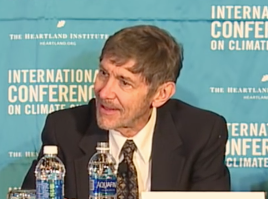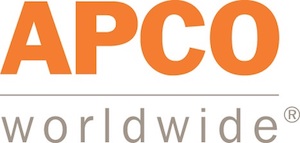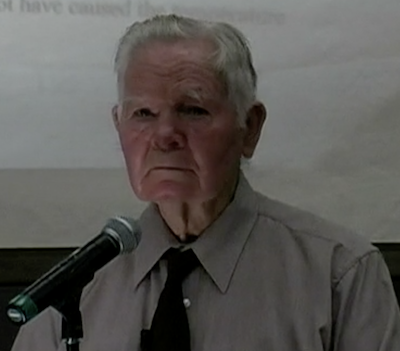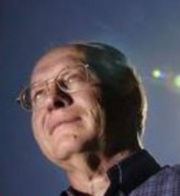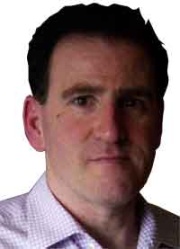Profile image screenshot from YouTube, J. Scott Armstrong speaking on a panel at the Heartland Institute’s 12th International Conference on Climate Change (ICCC12).
Scott Armstrong
Credentials
- Ph.D., Management, Massachusetts Institute of Technology.1 “J. Scott Armstrong,” Wharton University of Pennsylvania (Marketing Department). Archived February 10, 2012. Archive.fo URL: https://archive.fo/zNpit 2 “Dr. J. Scott Armstrong,” (PDF) CV at Wharton University of Pennsylvania, Marketing Department, March 26, 2019.
- M.S., Industrial Administration, Carnegie Mellon University.3 “J. Scott Armstrong,” Wharton University of Pennsylvania (Marketing Department). Archived February 10, 2012. Archive.fo URL: https://archive.fo/zNpit 4 “Dr. J. Scott Armstrong,” (PDF) CV at Wharton University of Pennsylvania, Marketing Department, March 26, 2019.
- B.S., Industrial Engineering, Lehigh University.5 “J. Scott Armstrong,” Wharton University of Pennsylvania (Marketing Department). Archived February 10, 2012. Archive.fo URL: https://archive.fo/zNpit 6 “Dr. J. Scott Armstrong,” (PDF) CV at Wharton University of Pennsylvania, Marketing Department, March 26, 2019.
- B.A., Applied Science, Lehigh University.7 “J. Scott Armstrong,” Wharton University of Pennsylvania (Marketing Department). Archived February 10, 2012. Archive.fo URL: https://archive.fo/zNpit 8 “Dr. J. Scott Armstrong,” (PDF) CV at Wharton University of Pennsylvania, Marketing Department, March 26, 2019.
Background
J. Scott Armstrong Ph.D is a marketing professor at the Wharton School of Business at the University of Pennsylvania. According to his website, Armstrong’s work focuses mainly on forecasting methods, strategic planning, survey research, and research methods.
Armstrong was the editor of Principles of Forecasting and the author of Long-Range Forecasting and Principles of Forecasting. He is also the co-founder of forecastingprinciples.com.
Stance on Climate Change
When Armstrong extended “The Climate Challenge” to Al Gore in June, 2007, he based his forecasts on “the naive (no-change) model; that is, the forecasts would be the same as the most recent year prior to the forecasts.”
Key Quotes
“We published a peer-reviewed paper showing that the forecasting procedures used by the U.N.’s Intergovernmental Panel on Climate Change violated 72 of 89 relevant principles (e.g., ‘provide full disclosure of methods’). The IPCC has been unable to explain why it violated such principles. In response, we developed a model that follows the principles. Because the climate is complex and poorly understood, our model predicts that global average temperatures will not change.”9 “Let’s Deal in Science and Facts,” Wall Street Journal, November 19, 2010.
“We concluded that there are no scientific forecasts that support long-term global warming, nor any that it would prove dangerous if it occurred, and none showing that cost-effective policies could stop warming. No one has provided evidence to challenge our conclusions. In fact, a leading global warming alarmist has been careful to say that the IPCC does not provide forecasts, only scenarios. In other words, the role of the IPCC is that of a storyteller.”10 J. Scott Armstrong. “Missing the mark on climate change skepticism: It’s not about the money, it’s about the science,” Washington Times, March 24, 2015.
“I actually try not to learn a lot about climate change.”11 Kate Sheppard. “House Skeptic Fest Kind of a Let Down for Deniers,” Mother Jones, April 1, 2011.
Key Deeds
February 4, 2018
In January 2018, more than 200 scientists endorsed an open letter calling on the American Museum of Natural History (AMNH) to remove climate change denier Rebekah Mercer from its board and to “end ties to anti-science propagandists and funders of climate science misinformation.” The New York Times reported that those among the AMNH letter calling for Mercer to step down were Michael E. Mann, director of the Earth System Science Center at Pennsylvania State University, and Katharine Hayhoe, director of the Climate Science Center at Texas Tech University.12 Robin Pogrebin and Somini Sengupta. “A Science Denier at the Natural History Museum? Scientists Rebel,” The New York Times, January 25, 2018. Archived February 13, 2018. Archive.is URL: https://archive.is/tAIv4
Armstrong was among a group of climate change deniers who responded with their own open letter, calling for the AMNH “not to cave in to this pressure.” The letter was signed by numerous individuals with ties to groups funded by the Mercer Family Foundation such as Will Happer of the CO2 CoalitionRichard Lindzen, a fellow at the Cato InstituteCraig Idso, the chairman of the Center for the Study of Carbon Dioxide and Global Change. There are a number of signatories affiliated with the Heartland Institute, which has received over $5.78 million from the Mercer Family Foundation since 2008.13 Graham Readfearn. “Climate Science Deniers Defend New York’s American Museum of Natural History From Calls to Drop Trustee Rebekah Mercer,” DeSmog, February 6, 2018.
The letter reads:14 mnh18-feb4-petitionletter (PDF – Untitled). Retrieved from Watts Up With That.
“The Earth has supported abundant life many times in the geological past when there were much higher levels of carbon dioxide in the atmosphere. It is quite likely that future generations will benefit from the enrichment of Earth’s atmosphere with more carbon dioxide.
“Make no mistake, the agitators are not defending science from quackery — quite the contrary!”
March 23, 2017
The Heartland Institute awarded a “Lifetime Achievement Award in Climate Science” to J. Scott Armstrong between dinner keynote presentations at the Twelfth International Conference on Climate Change (ICCC12). DeSmog captured audio of Armstrong’s acceptance speech, where he brought up a story on how he had made a visit to the 9/11 museum the previous summer.15 “DINNER KEYNOTES: ROBERT MENDELSOHN, PH.D. ROGER HELMER, MEP-UKIP,” ICCC12. Archived March 23, 2017. 16 Graham Readfearn. “Heartland Institute Award Winner Compares Work of Climate Science Deniers to 9/11 Firefighters,” DeSmog, March 23, 2017.
“I cry easily,” Armstrong said. “When I got to the part about the firemen […] you know […] that’s their duty. They go in there, and that’s what you guys do.”
In addition to receiving his award, Armstrong also spoke on a Heartland Institute panel on “Climate Politics and Policy” on the first day of the conference:17 “SCOTT ARMSTRONG,” Climateconference.heartland.org. Archived April 6, 2017. Archive.is URL: https://archive.is/aYtWp
February 23, 2017
Scott Armstrong was a signatory of a petition (PDF) organized by Richard Lindzen of the Cato Institute urging President Donald Trump to pull the United States out of the United Nations international convention on climate change (UNFCCC).18 “PETITION” (PDF), February 23, 2017. Richard Lindzen. PDF Archived at DeSmog.
“In just a few weeks, more than 300 eminent scientists and other qualified individuals from around the world have signed the petition below,” Lindzen wrote in the letter.19 “PETITION” (PDF), February 23, 2017. Richard Lindzen. PDF Archived at DeSmog.
DeSmog investigated the list, and found that only a small handful of the signatories could be considered “even remotely ‘qualified’ or ‘eminent’ — but not in the field of climate science.” The list included individuals “interested in climate,” and one signatory who only identified as an “emailer who wished to sign the petition” while some signers provided no affiliation or address whatsoever.20 Graham Readfearn. “Climate Science Denier Richard Lindzen’s List of 300 “Scientists” Sent to Trump Is the Usual Parade of Non-Experts,” DeSmog, February 27, 2017.
August 2016
Scott Armstrong is listed as a “Founding Member” of group named Climate Exit (Clexit) led by climate change denier Christopher Monckton. According to Clexit’s founding statement (PDF), “The world must abandon this suicidal Global Warming crusade. Man does not and cannot control the climate.”21 “The Clexit Committee comprises” (PDF), Clexit.net. Archived.pdf on file at Desmog. 22 “After Brexit, Clexit” (PDF), Clexit.net. Archived .pdf on file at Desmog.
Desmog reports on how the group grew in the wake of the UK’s decision to leave the EU. A key member of Clexit’s “60 well-informed science, business and economic leaders” is Hugh Morgan, a former board member of the Reserve Bank of Australia and former CEO of Western Mining Corporation with close ties to Australia’s Liberal party.23 Graham Readfearn. “After Brexit, Climate Science Denialists Form New Group to Call for a Clexit,” Desmog, August 3, 2016. 24 “Hugh Morgan AO,” Australian Government Department of Foreign Affairs and Trade. Archived February 22, 2002. Archive.is URL: https://archive.is/1ObOB
According to Clexit’s founding statement:
“If the Paris climate accord is ratified, or enforced locally by compliant governments, it will strangle the leading economies of the world with pointless carbon taxes and costly climate and energy policies, all with no sound basis in evidence or science […]”25 “After Brexit, Clexit” (PDF), Clexit.net. Archived .pdf on file at Desmog.
June 11–12, 2015
J. Scott Armstrong was a speaker on Panel 2: “Climate Science and Accurate Data,” at the Heartland Institute’s Tenth International Conference on Climate Change (ICCC10) in Washington, D.C., with Anthony Watts and Roy Spencer.26 “Speakers,” Heartland Institute. Archived June 30, 2015.
View J. Scott Armstrong’s Panel 2 presentation at the Heartland Institute’s ICCC10, below:27 “Panel 2: Climate Science and Accurate Data with Anthony Watts, Roy Spencer, Ph.D., and J. Scott Armstrong, Ph.D.,” Heartland Institute, June 11, 2015. Archived July 14, 2015.
March 2015
J. Scott Armstrong published an article in the Washington Times defending himself and fellow climate change skeptic Willie Soon. According to Armstrong, “Other than salaries from our employers, Mr. Soon, co-author Kesten Green and I received no money for our two papers at issue.”28 J. Scott Armstrong. “Missing the mark on climate change skepticism: It’s not about the money, it’s about the science,” Washington Times, March 24, 2015.
December 2014
Scott Armstrong is a contributor to the book Climate Change: The Facts published by the Institute of Public Affairs and featuring “22 essays on the science, politics and economics of the climate change debate.” The Institute of Public Affairs, while not revealing most of its funders, is known to have received funding from mining magnate Gina Rinehart and at least one major tobacco company.29 “Institute of Public Affairs,” SourceWatch. Accessed May 27, 2015.
The book includes essays and articles from a range of climate change skeptics, with contributors including the following:
- Alan Moran
- Andrew Bolt
- Anthony Watts
- Bernard Lewin
- Christopher Essex
- Donna Laframboise
- Garth W. Paltridge
- Ian Plimer
- J. Scott Armstrong
- James Delingpole
- Jennifer Marohasy
- Joanne Nova
- John Abbot
- Kesten Green
- Mark Steyn
- Nigel Lawson
- Patrick J. Michaels
- Richard S. Lindzen
- Robert M. Carter
- Ross McKitrick
- Rupert Darwall
- Stewart Franks
- Willie Soon
According to Editor Alan Moran in a post at Catallaxy Files blog on Climate Change: the facts 2014, Scott Armstrong and Kesten Green‘s contribution to the book was to “test the predictive validity of the global warming hypothesis and find it wanting. They point out that many other alarms have been raised over the past 200 years, none of which have proved to have substance. Most of the alarms that led governments into taking actions actually created harm and none provided benefits.”30 Alan Moran. “Climate Change: the facts 2014,” Catallaxy Files (blog), December 16, 2014.
January 27, 2012
Armstrong signed a Wall Street Journal Op-Ed titled “No Need to Panic About Global Warming.”31 “No Need to Panic About Global Warming,” The Wall Street Journal, January 27, 2012.
Other climate change skeptics who signed include Claude Allègre, Jan Breslow, William Happer, William Kininmonth, Richard Lindzen, James McGrath, Rodney Nichols, Burt Rutan, Harrison H. Schmitt, Nir Shaviv, Edward David, Michael Kelly, Henk Tennekes, and Antonino Zichichi.
Media transparency found that the Op-Ed had misrepresented the position of Yale economist William Nordhaus. SkepticalScience also did a comprehensive examination of the signatories and found that few of them had published anything in peer-reviewed journal on the subject of climate change.32 “The Journal Hires Dentists To Do Heart Surgery,” Media Transparency, January 30, 2012. 33 “The Latest Denialist Plea for Climate Change Inaction,” SkepticalScience, January 31, 2012.
May 2010
Armstrong was a speaker at the Heartland Institute‘s Fourth International Conference on Climate Change (ICCC4.)34 “4th International Conference on Climate Change” (PDF), The Heartland Institute. Accessed February 1, 2012, from University of Hartford server.
His speech, titled “Global Warming: A Scientific Forecasting Controversy or a Political Movement?” can be viewed below.
DeSmog has done research on the co-sponsors of the conference and found that 19 of the 65 sponsors (including Heartland itself) have received a total of over $40 million in funding since 1985 from ExxonMobil, Koch Industries family foundations or the Scaife family foundations.
March 30, 2009
Armstrong’s signature is displayed alongside a full-page ad funded by the CATO institute that appeared in numerous newspapers including the Washington Post, the New York Times and the Chicago Tribune in 2009.
The ad criticizes President Obama’s declaration that “few challenges facing America and the world are more urgent than combating climate change,” stating that “with all due respect Mr. President, that is not true.” It goes on to claim that “there has been no net global warming for over a decade,” and that the dangers of climate change are “grossly overstated.”35 “Climate Change Reality,” The Cato Institute.
March, 2009
Armstrong presented his research paper (co-authored by fellow skeptics Willie Soon and Kesten Green) on forecasting polar bear populations at the Heartland Institute‘s Second International Conference on Climate Change.36 “Second International Conference on Climate Change, Program.” (PDF) Heartland Institute. Archived January 23, 2018.
The paper, titled “Polar Bear Population Forecasts: A Public-Policy Forecasting Audit,” was published in Marketing Papers in 2008 and criticized projections of declining polar bear populations.
A rebuttal of the paper by numerous scientists was published at Interfaces.37 Steven C. Amstrup, Hal Caswell, Eric DeWeaver, Ian Stirling, David C. Douglas, Bruce G. Marcot, and Christine M. Hunter. “Rebuttal of ‘Polar Bear Population Forecasts: A Public-Policy Forecasting Audit’,” Interfaces, Vol. 39, No. 4 (July/August 2009).
March, 2008
Armstrong was a speaker at the Heartland Institute‘s First International Conference on Climate Change (ICCC1) where he gave a speech titled “Strengths and Weaknesses of Climate Models.”38 “First International Conference on Climate Change, Program.” (PDF) Heartland Institute. Archived January 23, 2018.
January 30, 2008
Scott Armstrong, who co-authored a paper with Kesten Green and Willie Soon on polar bears, testified before the Senate Environment and Public Works committee on the subject of climate change:
June 2007
In June, 2007, Armstrong extended a “Global Warming Challenge” to Al Gore. Although Al Gore declined the bet, Armstrong continued to track the hypothetical outcome on his website theclimatebet.com.39 “The Global Warming Challenge,” ClimateBet, June 16, 2007. Archived April 16, 2009.
Armstrong continues to use theclimatebet.com as a forum to post his research.
Affiliations
- Kesten Green, Willie Soon — Co-authored studies on climate change, and testified before congress on the subject of climate change. Green also serves as “advisor” to Armstrong’s website, theclimatebet.com.
- Climate Exit (Clexit) — ”Founding Member.”40 “The Clexit Committee comprises” (PDF), Clexit.net. Archived.pdf on file at Desmog.
Publications
Scott Armstrong, Willie Soon, and Kesten Green released an “unpublished working paper” arguing that the current forecast data on polar bear populations is inadequate for making a decision as to whether polar bears should be listed as a threatened species under the US Endangered Species Act.
While the polar bear paper is not published in a peer-reviewed scientific journal, it has appeared on websites such as the Science and Public Policy Institute website, Spiked Online, and various blogs.
His report was critiqued by the science writers at Realclimate.org who accuse Armstrong of having read “none of the primary literature,” only one chapter of the IPCC report and only “an un-peer reviewed hatchet job on the Stern Report” (a 2006 report on the economic impact of global warming completed by the British government).41 “Green and Armstrong’s scientific forecast,” RealClimate, July 20, 2007.
He also published a more recent paper: with Kesten Green in 2011 titled “Effects of the global warming alarm: A forecasting project using the structured analogies method” (PDF). Although this paper does not appear to be published in a peer-reviewed journal, Green and Armstrong do claim to “seek peer review from others, especially with evidence that would challenge our findings or conclusions.”
Other Resources
- “J. Scott Armstrong,” SourceWatch Profile.
- Dr. J. Scott Armstrong, CV (PDF) at Wharton University, as of March 2019.
- “J. Scott Amstrong,” Wikipedia profile.
- J. Scott Armstrong, Kesten C. Green, Willie Soon.”Polar Bear Population Forecasts: A Public-Policy Forecasting Audit,” Science and Public Policy Institute, Monday, December 17, 2007.
- “Research to date on Forecasting for the Manmade Global Warming Alarm Testimony to Subcommittee on Energy and Environment Committee on Science, Space and Technology – March 31, 2011” (PDF).
- Testimony Before U.S. House Committee on Climate Change, Climate Depot, March 31, 2011.
- Forecasting Problems for Global Warming Alarmists, Environment & Climate News (a publication of the Heartland Institute), July 1, 2010.
- “Interview of the author about Persuasive Advertising,” Fox News, May 25, 2010
- “Federal Polar Bear Research Critically Flawed, Forecasting Expert Asserts,” ScienceDaily, May 8, 2008.
- “Professor Scott Armstrong Exposing Inaccuracies in Polar Bear Studies”. News of Interest.TV.
- “Federal Polar Bear Research Critically Flawed, Argue Forecasting Experts in INFORMS Journal” – INFORMS: The Institute For Operations Research and The Management Sciences”. Informs.
- Amstrup A.J., Casswell H., DeWeaver E., Stirling I., Douglas D.C., Marcot B.G., Hunter C.M. (2009). “Rebuttal of “Polar Bear Population Forecasts: A Public-Policy Forecasting Audit.” Interfaces 39: 353–369.
Resources
- 1“J. Scott Armstrong,” Wharton University of Pennsylvania (Marketing Department). Archived February 10, 2012. Archive.fo URL: https://archive.fo/zNpit
- 2“Dr. J. Scott Armstrong,” (PDF) CV at Wharton University of Pennsylvania, Marketing Department, March 26, 2019.
- 3“J. Scott Armstrong,” Wharton University of Pennsylvania (Marketing Department). Archived February 10, 2012. Archive.fo URL: https://archive.fo/zNpit
- 4“Dr. J. Scott Armstrong,” (PDF) CV at Wharton University of Pennsylvania, Marketing Department, March 26, 2019.
- 5“J. Scott Armstrong,” Wharton University of Pennsylvania (Marketing Department). Archived February 10, 2012. Archive.fo URL: https://archive.fo/zNpit
- 6“Dr. J. Scott Armstrong,” (PDF) CV at Wharton University of Pennsylvania, Marketing Department, March 26, 2019.
- 7“J. Scott Armstrong,” Wharton University of Pennsylvania (Marketing Department). Archived February 10, 2012. Archive.fo URL: https://archive.fo/zNpit
- 8“Dr. J. Scott Armstrong,” (PDF) CV at Wharton University of Pennsylvania, Marketing Department, March 26, 2019.
- 9“Let’s Deal in Science and Facts,” Wall Street Journal, November 19, 2010.
- 10J. Scott Armstrong. “Missing the mark on climate change skepticism: It’s not about the money, it’s about the science,” Washington Times, March 24, 2015.
- 11Kate Sheppard. “House Skeptic Fest Kind of a Let Down for Deniers,” Mother Jones, April 1, 2011.
- 12Robin Pogrebin and Somini Sengupta. “A Science Denier at the Natural History Museum? Scientists Rebel,” The New York Times, January 25, 2018. Archived February 13, 2018. Archive.is URL: https://archive.is/tAIv4
- 13Graham Readfearn. “Climate Science Deniers Defend New York’s American Museum of Natural History From Calls to Drop Trustee Rebekah Mercer,” DeSmog, February 6, 2018.
- 14mnh18-feb4-petitionletter (PDF – Untitled). Retrieved from Watts Up With That.
- 15“DINNER KEYNOTES: ROBERT MENDELSOHN, PH.D. ROGER HELMER, MEP-UKIP,” ICCC12. Archived March 23, 2017.
- 16Graham Readfearn. “Heartland Institute Award Winner Compares Work of Climate Science Deniers to 9/11 Firefighters,” DeSmog, March 23, 2017.
- 17“SCOTT ARMSTRONG,” Climateconference.heartland.org. Archived April 6, 2017. Archive.is URL: https://archive.is/aYtWp
- 18“PETITION” (PDF), February 23, 2017. Richard Lindzen. PDF Archived at DeSmog.
- 19“PETITION” (PDF), February 23, 2017. Richard Lindzen. PDF Archived at DeSmog.
- 20Graham Readfearn. “Climate Science Denier Richard Lindzen’s List of 300 “Scientists” Sent to Trump Is the Usual Parade of Non-Experts,” DeSmog, February 27, 2017.
- 21“The Clexit Committee comprises” (PDF), Clexit.net. Archived.pdf on file at Desmog.
- 22“After Brexit, Clexit” (PDF), Clexit.net. Archived .pdf on file at Desmog.
- 23Graham Readfearn. “After Brexit, Climate Science Denialists Form New Group to Call for a Clexit,” Desmog, August 3, 2016.
- 24“Hugh Morgan AO,” Australian Government Department of Foreign Affairs and Trade. Archived February 22, 2002. Archive.is URL: https://archive.is/1ObOB
- 25“After Brexit, Clexit” (PDF), Clexit.net. Archived .pdf on file at Desmog.
- 26“Speakers,” Heartland Institute. Archived June 30, 2015.
- 27“Panel 2: Climate Science and Accurate Data with Anthony Watts, Roy Spencer, Ph.D., and J. Scott Armstrong, Ph.D.,” Heartland Institute, June 11, 2015. Archived July 14, 2015.
- 28J. Scott Armstrong. “Missing the mark on climate change skepticism: It’s not about the money, it’s about the science,” Washington Times, March 24, 2015.
- 29“Institute of Public Affairs,” SourceWatch. Accessed May 27, 2015.
- 30Alan Moran. “Climate Change: the facts 2014,” Catallaxy Files (blog), December 16, 2014.
- 31“No Need to Panic About Global Warming,” The Wall Street Journal, January 27, 2012.
- 32“The Journal Hires Dentists To Do Heart Surgery,” Media Transparency, January 30, 2012.
- 33“The Latest Denialist Plea for Climate Change Inaction,” SkepticalScience, January 31, 2012.
- 34“4th International Conference on Climate Change” (PDF), The Heartland Institute. Accessed February 1, 2012, from University of Hartford server.
- 35“Climate Change Reality,” The Cato Institute.
- 36“Second International Conference on Climate Change, Program.” (PDF) Heartland Institute. Archived January 23, 2018.
- 37Steven C. Amstrup, Hal Caswell, Eric DeWeaver, Ian Stirling, David C. Douglas, Bruce G. Marcot, and Christine M. Hunter. “Rebuttal of ‘Polar Bear Population Forecasts: A Public-Policy Forecasting Audit’,” Interfaces, Vol. 39, No. 4 (July/August 2009).
- 38“First International Conference on Climate Change, Program.” (PDF) Heartland Institute. Archived January 23, 2018.
- 39“The Global Warming Challenge,” ClimateBet, June 16, 2007. Archived April 16, 2009.
- 40“The Clexit Committee comprises” (PDF), Clexit.net. Archived.pdf on file at Desmog.
- 41“Green and Armstrong’s scientific forecast,” RealClimate, July 20, 2007.

